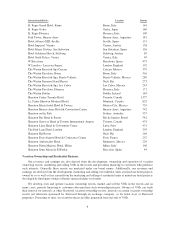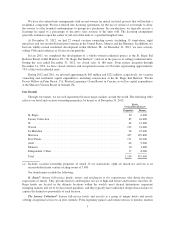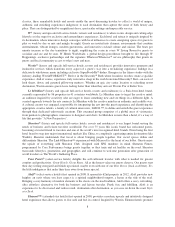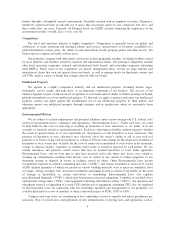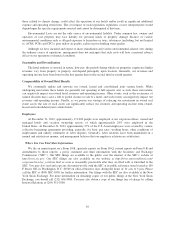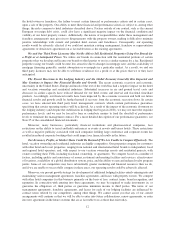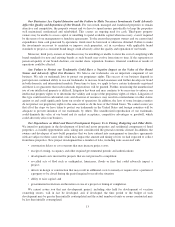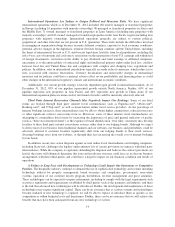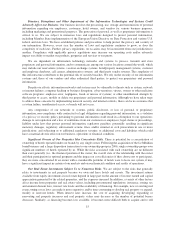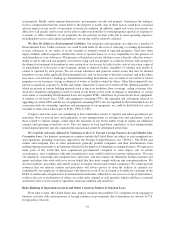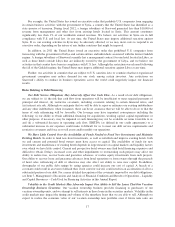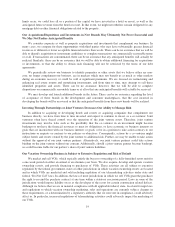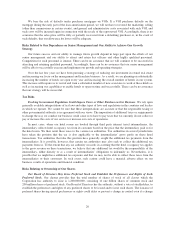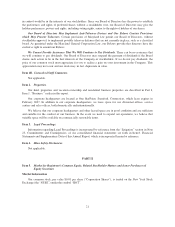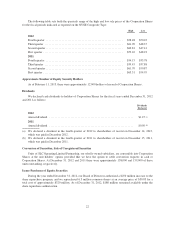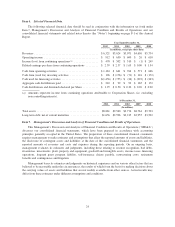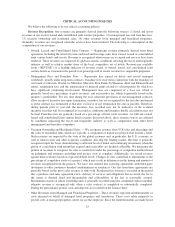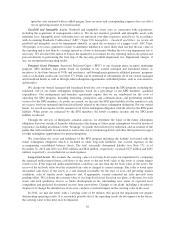Starwood 2012 Annual Report Download - page 115
Download and view the complete annual report
Please find page 115 of the 2012 Starwood annual report below. You can navigate through the pages in the report by either clicking on the pages listed below, or by using the keyword search tool below to find specific information within the annual report.real property. Finally, under eminent domain laws, governments can take real property. Sometimes this taking is
for less compensation than the owner believes the property is worth. Any of these factors could have a material
adverse impact on our results of operations or financial condition. In addition, equity real estate investments are
difficult to sell quickly and we may not be able to adjust our portfolio of owned properties quickly in response to
economic or other conditions. If our properties do not generate revenue sufficient to meet operating expenses,
including debt service and capital expenditures, our income will be adversely affected.
We May Be Subject to Environmental Liabilities. Our properties and operations are subject to a number of
Environmental Laws. Under such laws, we could be held liable for the costs of removing or cleaning up hazardous
or toxic substances at, on, under, or in our currently or formerly owned or operated properties. Such laws often
impose liability without regard to whether the owner or operator knew of, or was responsible for, the presence of
such hazardous or toxic substances. The presence of hazardous or toxic substances may adversely affect the owner’s
ability to sell or rent such real property or to borrow using such real property as collateral. Persons who arrange for
the disposal or treatment of hazardous or toxic materials or wastes may be liable for the costs of extraction, removal
or remediation of such wastes at the treatment, storage or disposal facility, regardless of whether such facility is
owned or operated by such person. We use certain substances and generate certain wastes that may be deemed
hazardous or toxic under applicable Environmental Laws, and we from time to time have incurred, and in the future
may incur, costs related to cleaning up contamination resulting from historic uses at certain of our current or former
properties or our treatment, storage or disposal of wastes at facilities owned by others. Other Environmental Laws
govern occupational exposure to ACMs and require abatement or removal of certain ACMs (limited quantities of
which are present in various building materials such as spray-on insulation, floor coverings, ceiling coverings, tiles,
decorative treatments and piping located at certain of our hotels) in the event of damage or demolition, or certain
renovations or remodeling. Environmental Laws also regulate PCBs, which may be present in electrical equipment.
A number of our hotels have USTs and equipment containing CFCs; the operation and subsequent removal or
upgrading of certain USTs and the use of equipment containing CFCs also are regulated by Environmental Laws. In
connection with our ownership, operation and management of our properties, we could be held liable for costs of
remedial or other action with respect to PCBs, USTs or CFCs.
Congress and some states are considering or have undertaken actions to regulate and reduce greenhouse gas
emissions. New or revised laws and regulations or new interpretations of existing laws and regulations, such as
those related to climate change, could affect the operation of our hotels and/or result in significant additional
expense and operating restrictions on us. The cost impact of such legislation, regulation, or new interpretations
would depend upon the specific requirements enacted and cannot be determined at this time.
We Could Be Adversely Affected by Violations of the U.S. Foreign Corrupt Practices Act and Similar Anti-
Corruption Laws. Our business operations in countries outside the United States are subject to anti-corruption laws
and regulations, including restrictions imposed by the Foreign Corrupt Practices Act (“FCPA”). The FCPA and
similar anti-corruption laws in other jurisdictions generally prohibit companies and their intermediaries from
making improper payments to government officials for the purpose of obtaining or retaining business. We operate in
many parts of the world that have experienced governmental corruption to some degree and, in certain
circumstances, strict compliance with anti-corruption laws may conflict with local customs and practices. We train
our employees concerning anti-corruption laws and issues, and also require our third-party business partners and
agents and others who work with us or on our behalf that they must comply with our anti-corruption policies. We
also have policies, procedures and controls in place to monitor internal and external compliance. We cannot provide
assurance that our internal controls and procedures will always protect us from the reckless or criminal acts
committed by our employees or third-parties with whom we work. If we are found to be liable for violations of the
FCPA or similar anti-corruption laws in international jurisdictions, either due to our own acts or out of inadvertence,
or due to the acts or inadvertence of others, we could suffer criminal or civil penalties which could have a material
and adverse effect on our results of operations, financial condition and cash flows.
Risks Relating to Operations in Syria and Other Countries Subject to Sanction Laws
From time to time, the United States may impose sanctions that prohibit U.S. companies from engaging in
business activities with certain persons or foreign countries or governments that it determines are adverse to U.S.
foreign policy interests.
16


